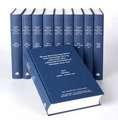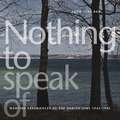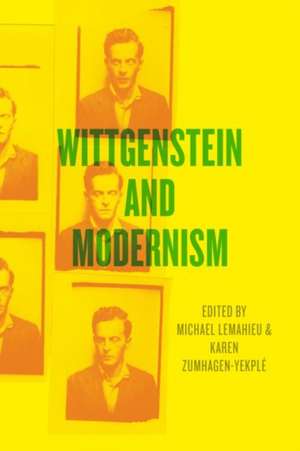Wittgenstein and Modernism: Emersion: Emergent Village resources for communities of faith
Editat de Michael LeMahieu, Karen Zumhagen-Yekpléen Limba Engleză Hardback – 29 dec 2016
Ludwig Wittgenstein famously declared that philosophy “ought really to be written only as a form of poetry,” and he even described the Tractatus as “philosophical and, at the same time, literary.” But few books have really followed up on these claims, and fewer still have focused on their relation to the special literary and artistic period in which Wittgenstein worked. This book offers the first collection to address the rich, vexed, and often contradictory relationship between modernism—the twentieth century’s predominant cultural and artistic movement—and Wittgenstein, one of its preeminent and most enduring philosophers. In doing so it offers rich new understandings of both.
Michael LeMahieu Karen Zumhagen-Yekplé bring together scholars in both twentieth-century philosophy and modern literary studies to put Wittgenstein into dialogue with some of modernism’s most iconic figures, including Samuel Beckett, Saul Bellow, Walter Benjamin, Henry James, James Joyce, Franz Kafka, Adolf Loos, Robert Musil, Wallace Stevens, and Virginia Woolf. The contributors touch on two important aspects of Wittgenstein’s work and modernism itself: form and medium. They discuss issues ranging from Wittgenstein and poetics to his use of numbered propositions in the Tractatus as a virtuoso performance of modernist form; from Wittgenstein’s persistence metaphoric use of religion, music, and photography to an exploration of how he and Henry James both negotiated the relationship between the aesthetic and the ethical.
Covering many other fascinating intersections of the philosopher and the arts, this book offers an important bridge across the disciplinary divides that have kept us from a fuller picture of both Wittgenstein and the larger intellectual and cultural movement of which he was a part.
Michael LeMahieu Karen Zumhagen-Yekplé bring together scholars in both twentieth-century philosophy and modern literary studies to put Wittgenstein into dialogue with some of modernism’s most iconic figures, including Samuel Beckett, Saul Bellow, Walter Benjamin, Henry James, James Joyce, Franz Kafka, Adolf Loos, Robert Musil, Wallace Stevens, and Virginia Woolf. The contributors touch on two important aspects of Wittgenstein’s work and modernism itself: form and medium. They discuss issues ranging from Wittgenstein and poetics to his use of numbered propositions in the Tractatus as a virtuoso performance of modernist form; from Wittgenstein’s persistence metaphoric use of religion, music, and photography to an exploration of how he and Henry James both negotiated the relationship between the aesthetic and the ethical.
Covering many other fascinating intersections of the philosopher and the arts, this book offers an important bridge across the disciplinary divides that have kept us from a fuller picture of both Wittgenstein and the larger intellectual and cultural movement of which he was a part.
Din seria Emersion: Emergent Village resources for communities of faith
-
 Preț: 160.63 lei
Preț: 160.63 lei -
 Preț: 229.92 lei
Preț: 229.92 lei -
 Preț: 133.99 lei
Preț: 133.99 lei -
 Preț: 182.98 lei
Preț: 182.98 lei - 18%
 Preț: 348.59 lei
Preț: 348.59 lei - 9%
 Preț: 352.77 lei
Preț: 352.77 lei - 12%
 Preț: 290.56 lei
Preț: 290.56 lei -
 Preț: 307.53 lei
Preț: 307.53 lei - 8%
 Preț: 360.28 lei
Preț: 360.28 lei -
 Preț: 208.31 lei
Preț: 208.31 lei -
 Preț: 279.55 lei
Preț: 279.55 lei -
 Preț: 302.76 lei
Preț: 302.76 lei - 18%
 Preț: 2261.34 lei
Preț: 2261.34 lei -
 Preț: 115.82 lei
Preț: 115.82 lei -
 Preț: 156.84 lei
Preț: 156.84 lei -
 Preț: 115.53 lei
Preț: 115.53 lei -
 Preț: 161.27 lei
Preț: 161.27 lei - 8%
 Preț: 311.68 lei
Preț: 311.68 lei -
 Preț: 167.85 lei
Preț: 167.85 lei - 8%
 Preț: 346.31 lei
Preț: 346.31 lei - 6%
 Preț: 324.95 lei
Preț: 324.95 lei -
 Preț: 176.49 lei
Preț: 176.49 lei - 9%
 Preț: 353.24 lei
Preț: 353.24 lei -
 Preț: 101.43 lei
Preț: 101.43 lei -
 Preț: 144.80 lei
Preț: 144.80 lei - 8%
 Preț: 563.24 lei
Preț: 563.24 lei - 8%
 Preț: 564.99 lei
Preț: 564.99 lei -
 Preț: 215.51 lei
Preț: 215.51 lei -
 Preț: 146.50 lei
Preț: 146.50 lei -
 Preț: 216.08 lei
Preț: 216.08 lei -
 Preț: 176.35 lei
Preț: 176.35 lei -
 Preț: 273.93 lei
Preț: 273.93 lei -
 Preț: 144.99 lei
Preț: 144.99 lei -
 Preț: 128.69 lei
Preț: 128.69 lei -
 Preț: 183.89 lei
Preț: 183.89 lei -
 Preț: 106.35 lei
Preț: 106.35 lei -
 Preț: 548.71 lei
Preț: 548.71 lei -
 Preț: 179.04 lei
Preț: 179.04 lei - 9%
 Preț: 352.50 lei
Preț: 352.50 lei -
 Preț: 138.81 lei
Preț: 138.81 lei -
 Preț: 147.26 lei
Preț: 147.26 lei -
 Preț: 67.35 lei
Preț: 67.35 lei -
 Preț: 127.89 lei
Preț: 127.89 lei -
 Preț: 209.88 lei
Preț: 209.88 lei - 18%
 Preț: 502.35 lei
Preț: 502.35 lei -
 Preț: 138.26 lei
Preț: 138.26 lei -
 Preț: 94.22 lei
Preț: 94.22 lei -
 Preț: 126.25 lei
Preț: 126.25 lei -
 Preț: 92.35 lei
Preț: 92.35 lei -
 Preț: 163.52 lei
Preț: 163.52 lei
Preț: 538.11 lei
Preț vechi: 696.44 lei
-23% Nou
Puncte Express: 807
Preț estimativ în valută:
102.98€ • 106.38$ • 85.71£
102.98€ • 106.38$ • 85.71£
Carte indisponibilă temporar
Doresc să fiu notificat când acest titlu va fi disponibil:
Se trimite...
Preluare comenzi: 021 569.72.76
Specificații
ISBN-13: 9780226420370
ISBN-10: 022642037X
Pagini: 336
Dimensiuni: 152 x 229 x 25 mm
Greutate: 0.51 kg
Editura: University of Chicago Press
Colecția University of Chicago Press
Seria Emersion: Emergent Village resources for communities of faith
ISBN-10: 022642037X
Pagini: 336
Dimensiuni: 152 x 229 x 25 mm
Greutate: 0.51 kg
Editura: University of Chicago Press
Colecția University of Chicago Press
Seria Emersion: Emergent Village resources for communities of faith
Notă biografică
Michael LeMahieu is associate professor of English at Clemson University and coeditor of the journal Contemporary Literature. He is the author of Fictions of Fact and Value: The Erasure of Logical Positivism in American Literature, 1945–1975. Karen Zumhagen-Yekplé is assistant professor of English and an affiliated faculty member in the Stone Center for Latin American Studies and the Programs for Gender Studies and Film Studies at Tulane University.
Cuprins
Acknowledgments
Introduction: Wittgenstein, Modernism, and the Contradictions of Writing Philosophy as Poetry
Michael LeMahieu and Karen Zumhagen-Yekplé
Part 1 Wittgenstein’s Modernist Context
1 Wittgenstein and Modernism in Literature: Between the Tractatus and the Philosophical Investigations
Anthony J. Cascardi
2 “To Become a Different Person”: Wittgenstein, Christianity, and the Modernist Ethos
Marjorie Perloff
3 The Concept of Expression in the Arts from a Wittgensteinian Perspective
Charles Altieri
4 Wittgenstein, Loos, and Critical Modernism: Style and Idea in Architecture and Philosophy
Allan Janik
Part 2 Wittgenstein’s Modernist Cultures
5 Loos, Musil, Wittgenstein, and the Recovery of Human Life
Piergiorgio Donatelli
6 Wittgenstein, Benjamin, and Pure Realism
Eli Friedlander
7 What Makes a Poem Philosophical?
John Gibson
Part 3 Wittgenstein and Literary Modernism
8 In the Condition of Modernism: Philosophy, Literature, and The Sacred Fount
Kristin Boyce
9 The World as Bloom Found It: “Ithaca,” the Tractatus, and “Looking More than Once for the Solution of Difficult Problems in Imaginary or Real Life”
Karen Zumhagen-Yekplé
10 Lectures on Ethics: Wittgenstein and Kafka
Yi-Ping Ong
11 Bellow’s Private Language
Michael LeMahieu
Notes
List of Contributors
Index
Introduction: Wittgenstein, Modernism, and the Contradictions of Writing Philosophy as Poetry
Michael LeMahieu and Karen Zumhagen-Yekplé
Part 1 Wittgenstein’s Modernist Context
1 Wittgenstein and Modernism in Literature: Between the Tractatus and the Philosophical Investigations
Anthony J. Cascardi
2 “To Become a Different Person”: Wittgenstein, Christianity, and the Modernist Ethos
Marjorie Perloff
3 The Concept of Expression in the Arts from a Wittgensteinian Perspective
Charles Altieri
4 Wittgenstein, Loos, and Critical Modernism: Style and Idea in Architecture and Philosophy
Allan Janik
Part 2 Wittgenstein’s Modernist Cultures
5 Loos, Musil, Wittgenstein, and the Recovery of Human Life
Piergiorgio Donatelli
6 Wittgenstein, Benjamin, and Pure Realism
Eli Friedlander
7 What Makes a Poem Philosophical?
John Gibson
Part 3 Wittgenstein and Literary Modernism
8 In the Condition of Modernism: Philosophy, Literature, and The Sacred Fount
Kristin Boyce
9 The World as Bloom Found It: “Ithaca,” the Tractatus, and “Looking More than Once for the Solution of Difficult Problems in Imaginary or Real Life”
Karen Zumhagen-Yekplé
10 Lectures on Ethics: Wittgenstein and Kafka
Yi-Ping Ong
11 Bellow’s Private Language
Michael LeMahieu
Notes
List of Contributors
Index
Recenzii
"It is thrilling to read so many very different demonstrations of what happens when you cross multiply the objects and means of interpretation provided by Wittgenstein with those provided by modernist studies. ...the best of these essays are exemplary: they show how this kind of interdisciplinary work can be done rigorously and also with devotion.”
“Although the volume concerns Wittgenstein and modernism in particular, the problem that it confronts is a very general one: it is the ancient question, deriving from Plato, of the relationship between art and philosophy….As a whole, the volume presents a rich and stimulating framework that will be of interest to both those who work in the philosophical field and those who work in the literary field.”
"This is an interesting book. The idea governing the collection is that Wittgenstein can, and perhaps should, be read in the context of modernist art and literature. This is not to say that LeMahieu (Clemson Univ.) and Zumhagen-Yekplé (Tulane Univ.) and their fellow contributors deny that Wittgenstein is a philosopher, but instead that they claim that modernism sheds light on the philosopher's aims and methods. The approach proves fertile, since Wittgenstein always had a strong interest in the arts. However, his literary interests tended more towards Romanticism, in particular the work of Goethe. The one weakness of this collection is that none of the essays addresses the Romantic elements of Wittgenstein's work and whether his purported Romanticism can be reconciled with his purported modernism. Whatever the case may be, this volume will certainly interest philosophers working on Wittgenstein and students of modernism in the arts and letters more generally. Recommended."
"In their comprehensive introduction – which stands alone as an essay of immense value to any reader interested in the topic – the volume’s editors examine the conditions which have led to Wittgenstein’s relative absence from discussions of aesthetic modernism to date….Weaving together thoughtful analysis of Wittgenstein’s work, reinvigorating extant approaches and carving new paths, along with ventures into the many genres and productions of modernist literature and thought, the volume fulfills its promise to “make clear a range of possible topics, thus augmenting our understanding of what can be included in the new modernist studies and also presenting new ways of understanding Wittgenstein’s modernist philosophy at a time in which philosophy, literature, and the humanities writ large might still be said to exist in a modernist condition.' The authors involved in this project offer models of interdisciplinary scholarship, presenting not superficial connections between coincidental materials, but rather deeply considered channels of mutual influence that illuminate important insights and shift our ways of viewing the individual objects under consideration, and the complex of aesthetics and philosophy at the heart of modernism."
“…The contributors to Wittgenstein and Modernism have done essential work to map the contours of this interdisciplinary subfield and to carry forward a critical discussion in which, one suspects, there remains a great deal to say.”
"Impressively, each essay manages to say something compelling about Wittgenstein while also illuminating the literary texts under discussion. These are not at applications of Wittgenstein’s method...to literary texts, nor do they simply align Wittgenstein with a preconceived notion of modernism. These essays, in the words of Anthony Cascardi, show how “conventional distinctions between ‘literature’ and ‘philosophy’ may not hold” even as the two enterprises remain conceptually distinct (25). Thus, despite the obvious divergences in the authors’ takes on Wittgenstein—registering as they do the perennial debates about Wittgenstein’s career that either find continuities across his two major works or posit a sharp break between them, as well as the debates between so-called resolute readings that take seriously the claim that the entire Tractatus is nonsense and those that find meaning within its propositions—what emerges from the volume is the consistency with which Wittgenstein was, at bottom, an aesthetic thinker."
